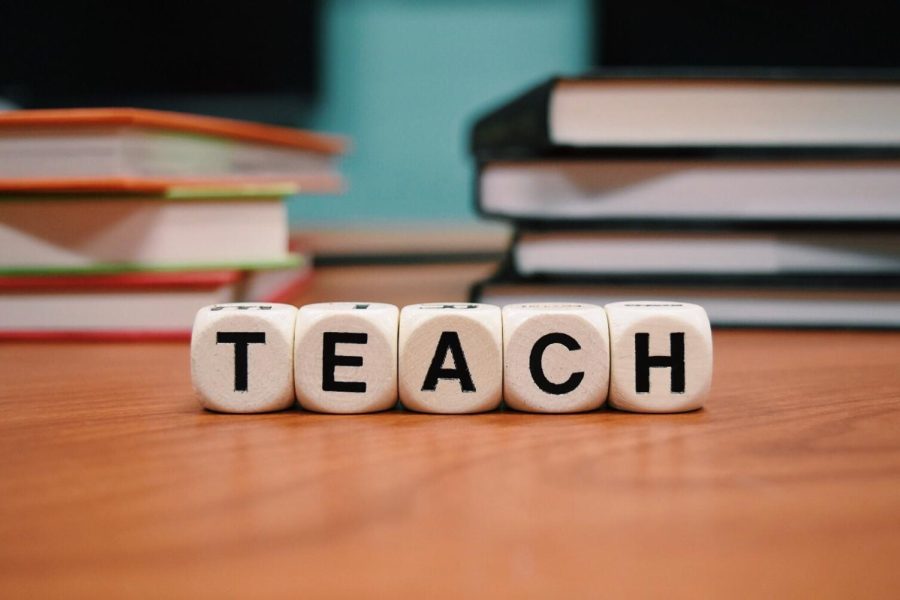SPHS New V. Veteran Teachers
February 28, 2022
David Squibb will never forget his middle school science teacher. He recounts her energetic personality, her fun lesson plans, and how she made all of her students excited to learn about science. Squibb deems her class as the most fun class he has ever had. However, at the end of the year, her students are dumbstruck! She reveals to them that it was only her first year of teaching.
“I know that had she told us beforehand, I think…we would have probably viewed that class a little differently,” says Squibb, a new Math 1 teacher at San Pasqual High School. “…It’s not how long you’ve been a teacher that determines how good of a teacher you are, but that perception still exists… Cause I’ve had really great first-year teachers, and I’ve had teachers who have been doing it a while who still have room to grow. So it could go either way, but that perception still exists.”
Julie Baker-Conte, a biology teacher at San Pasqual High School who has been teaching for 23 years, agrees that there is still this perception about new and old teachers. Namely, some students may judge new teachers as either inexperienced and unworthy of respect or as a friend rather than as an educator.
However, Baker-Conte emphasizes that “all teachers have different personalities, so every teacher gets treated differently by students based on who they are.”
On the other hand, Debbie Borunda, a Math 1, Math 2, and ELD teacher, explains she is having a slightly different experience. As a young teacher in her first year of teaching, Borunda says that depending on the relationship built with her students, some students may like her more or treat her as a friend since they perceive her to be close in age. While others do not respect her as much as older teachers because she looks young.
“It all just depends, but I definitely think, yes, [students] treat you differently based off your age,” concludes Borunda.
Teacher Talk, Time Management, and Student Conflicts
The first few weeks of teaching can be nerve-wracking. A major obstacle many teachers face in the beginning is becoming comfortable with talking in front of a class. About 77% of the population has some level of fear towards public speaking; new teachers are no exception. To an introverted person or just any other person new to public speaking, always having something to say when teaching a class can be a taxing experience.
“This year…is my first year of teaching, so I was most nervous about now having 30 something students in front of me and having to deal with classroom behaviors, talking, and things like that,” says Borunda.
Another obstacle new teachers have to consider is staying organized. As a teacher, time management is essential for effectively running a classroom. They need to plan lessons, grade assignments, budget their time, and divide their work evenly throughout the day in order to get everything done, especially teachers with multiple classes.
Ron Rogers, San Pasqual’s 29-year English teacher, now currently teaching English 9 prep and honors, elaborates on the struggle of time management when he was a new teacher. “I was…not only teaching three different subjects at the time; I had three or four different classrooms,” explains Rogers. “So I was a traveling teacher and… I was coaching football and wrestling, so there just weren’t enough hours in the day to do everything I was attempting to do.”
Furthermore, as a new teacher, there is almost always a struggle with student conflicts. Borunda explains her current struggles with some students as a first-year teacher.
“I think the biggest struggle is dealing…with students that might have some conflict with me that might be personal and trying to work through it so that I can get them to want to try in math,” says Borunda.
Many other teachers can relate to Borunda. Baker-Conte explains that her biggest challenge was deciding which student actions were worth combatting because reprimanding certain students can deplete a teacher’s energy quickly and unnecessarily.
“So you have to learn which battles that you want to fight and which ones you want to just let go,” shares Baker-Conte.
Other veteran teachers also face similar issues with students—problems that may have not been an issue before but are problems now. Rogers’s current struggle, he says, is with the disrespect from students. In previous decades, he expresses how there was a clear line in the classroom between the teacher and the student, where the teacher is a respected adult. In contrast, this generation has had no respect towards the teacher, so that line is blurred.
Veteran Teachers and Technology
Veteran teachers, like new teachers, still encounter many struggles. One issue troubling more veteran teachers is technology. Technology is extremely prevalent in this generation, especially since most schoolwork is done online. In fact, about 45% of students say they are online constantly, or they are addicted to their phones which does not make teachers’ jobs any easier.
“Students love their cell phones, and it’s really hard to compete with that instant entertainment value in the pocket of my students,” explains Baker-Conte. As San Pasqual’s biology teacher, a huge aspect of Baker-Conte’s job is to teach students about life on Earth. However, with students’ addiction to their cell phones, it has become more difficult to engage students in learning and discovering the joy of experiencing nature.
Rogers also encounters the same challenges. When asked about what kinds of criticism he receives from students, Rogers believes “[students] might not agree with what I’m asking them to do because they would rather be on their computers and phones, playing video games.”
The Pros and Cons of New and Old Teachers
Overall, both new and old teachers have their strengths and weaknesses. To start, newer teachers bring in fresh ideas, new technology, creative theories, up-to-date research, and most of all, optimism. According to Jennifer Franey, who has been teaching for 20 years, now an English 10 honors teacher at San Pasqual High School, new teachers have lively energy that reflects on their students and co-workers and a sense of responsibility to believe in their students and have faith that they will succeed.
“I think the challenge when you are a more veteran teacher is keeping that optimism, keeping that faith and that belief, because it is a very complex system,” says Franey. “And so a lot of times people have ideas, and then they hit the road.”
Baker-Conte adds how veteran teachers are stuck in the old days. Even though making changes may be in the best interest of their students, many are unwilling to adopt new methods because they have been teaching a certain way for so long. However, veteran teachers have comparatively much more experience. Most know how to effectively run a classroom and understand multiple aspects of the educational process/system through their own trials and errors.
“Old teachers have more experience running a classroom and… just kind of doing stuff within the system, but new teachers bring a bunch of new ideas to the mix,” concludes Baker-Conte.
What Do All Teachers Have in Common?
Although there are various differences between new and veteran teachers, they are almost always guaranteed to have one thing in common. Here at San Pasqual High School, most teachers’ greatest joy in their job is just helping their students and seeing them succeed. To Rogers, it is always pleasant to see students finally understand a concept that they had no previous knowledge of beforehand; Borunda, a much newer teacher than Rogers, shares the same joy. When students discover while learning math that “aha moment”, she sees students who initially have struggled in math get really excited and confident about the topic.
“When students discover something that they think is interesting… you can see [their] face light up when they learned something they didn’t know,” summarizes Baker-Conte.
Franey adds that she likes to support her students, whether it be in their literacy skills, communication, writing, or something completely different. She wants to ensure that students are aware of their voice, and their words can be impactful to the world around them.
Finally, almost all teachers, at first, must find a rhythm that fits their teaching style and classroom, so it feels comfortable and reassuring. Constantly changing lessons, trying new methods, and having realistic expectations are all part of the procedure, and failure is inevitable. Amidst failed lesson plans, loads of stress, and practically no control in certain situations, teachers like David Squibb still maintain a positive attitude.
“You just don’t know what to expect,” says Squibb. When asked how he has overcome these new obstacles, his method was “just getting up and trying again the next day.”



